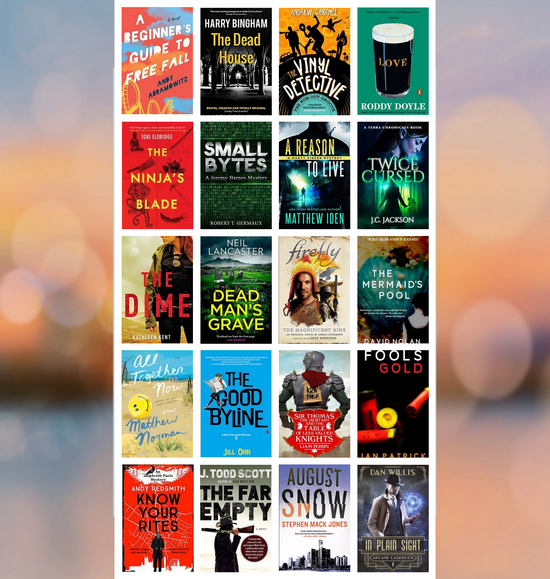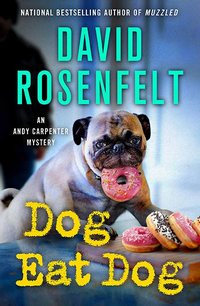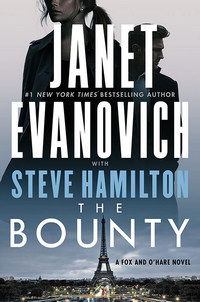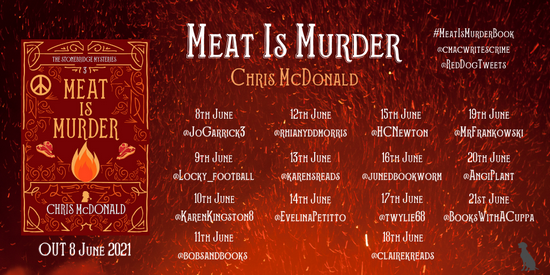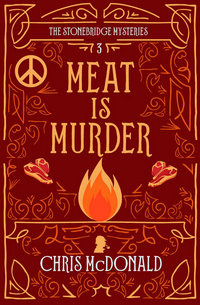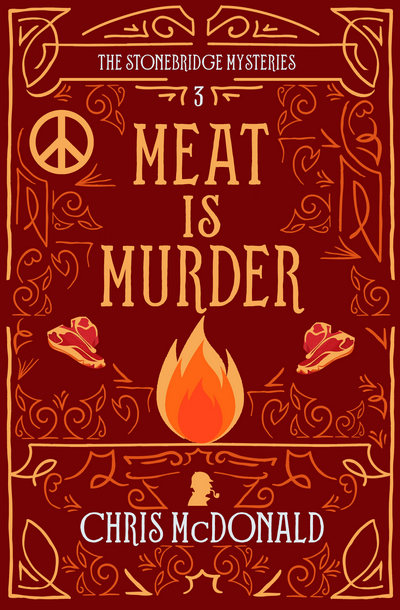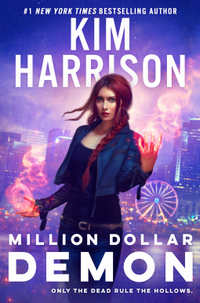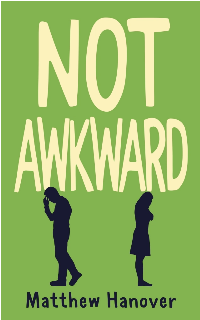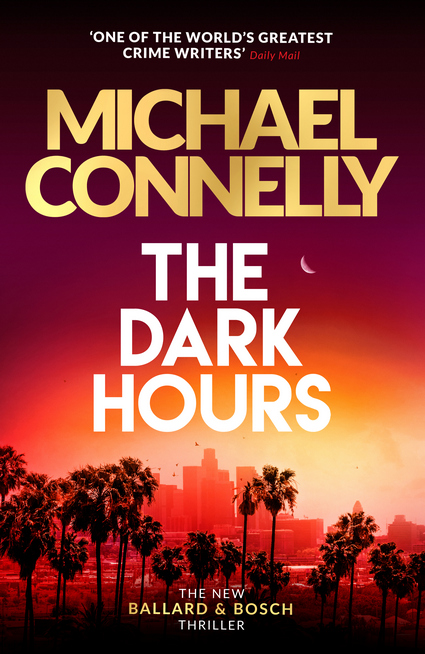This is a little (pun unintended but embraced) awkward to write—I served as a beta reader for this and had intended to wait until the final version was published to say anything. But Hanover asked, so here we go. Many things may (and have) changed from the draft that I read and what will be published in a couple of months, so I’m not going to get into some of the particulars that I want to until then, and I know what the final version will be like. Hopefully, this isn’t too vague as a result:

What’s Not Awkward About?
I’m assuming I’m not the only one who finds themselves in a situation like this—I halfway expected to find a Jeff Murdock monologue about this, but alas… You go to an event of some kind because of family obligation, an acquaintance, your Significant Other’s employer—not because you really want to, but you feel you should. Once there, you stay an adequate amount of time and try to make your excuses and leave. But the host or someone talks you into staying for a little longer, and a little longer after that. While you may not be actively hating the experience, you’re certainly not enjoying yourself much and are looking for an opportunity to make a tactful exit.
This is pretty much the situation that Scott finds himself in. But rather than a birthday party for your second cousin you haven’t seen in a decade, Scott finds himself as a guest at his ex-girlfriend’s house while they sit shiva for her father. Recently fired and about to get married, Scott felt like he should go to the funeral for the man who always treated him so well. One thing led to another and Leila’s mother compelled him to stay for a night, which turns into another, and another…
Scott’s fiance, Charlotte, is off for a bachelorette’s week with his sister and Charlotte’s closest friend, Quinn. So there’s nothing for him to go home to, and he can search for jobs from Leila’s as well as anywhere. So he sticks around as emotional support (and/or emotional punching bag, depending on Leila’s understandably shifting moods require), and finds himself with an opportunity to get the closure he didn’t realize he needed and maybe even an explanation for why she dumped him out of the blue six years ago. Or maybe, something else will end up happening between the two.
Speedcubing
A few months ago, one of the local newscasts had a feature about an area resident who used to take part in Rubik’s Cube competitions on a pretty high level, it looked back on his competitions and “does he still have it?” No, he doesn’t. But he’s still faster than at least 96% of anyone who’s ever solved one.
So when we learn that Charlotte is a speedcuber, going to competitions, posting videos to social media, my mind immediately went back to that and I was in. Most readers aren’t going to have that particular background, but Charlotte’s hobby (for lack of a better word, but it’s not quite right) is going to make her stand out in readers’ minds—how often have you come across a character who does that? What I appreciated most about the Rubik’s cube thing is that was it starts out as a character quirk, but by the end, Hanover finds some thoughtful things to do with it—revealing something about the character (and a little more).
The Sister Factor
A mistake that readers like me can make is to think they’ve figured out all a writer’s moves, I really thought I had a handle on the role of “protagonist’s sister” in Hanover’s books. So when Quinn shows up pretty early, I sat up and paid attention to her. Which is when I noticed that Quinn is going to serve another role in this novel. She’s not an antagonist, but she’s certainly an obstacle for both Charlotte and Scott to overcome.
She’s been best friends with Charlotte since childhood—and try as she might, she’s still having trouble shifting from being Charlotte’s best friend to her best friend and brother’s significant other/future sister-in-law. I wasn’t entirely sold on this particular arc, but it helped us get a different look at Scott and his love life, and in the final third or so of the novel, it really paid off.
Along the same lines, Hanover hasn’t given us a protagonist’s brother before. I really didn’t care for this one—but I wasn’t supposed to*, he was written in such a way that it’d be hard to like him at all. But Scott and Quinn having an older brother is a new dynamic for Hanover and it works pretty well.
* And I won’t even get started about his wife.
The Interconnectedness of It All
In Not Dressed, Hanover alludes to a couple of characters and events from Not Famous, but here in Not Awkward he goes a lot further—the characters and events actually show up in the text. Sure, it’s done in such a way that people who haven’t read the other books won’t be short-changed when it comes to understanding this novel. But if you have read them, you’ll appreciate the way that Hanover has woven them into these pages.
It’s a great way to make a reader smile when they recognize something. But better, it’s a fantastic way to touch base with characters from one of those books. “Oh, look X got engaged.” Or “hey, Y and Z will be working together.” We also get to see characters like that in a different setting and from a different perspective. Rather than having to go through the bother with writing a whole new novel about one of Not Dressed‘s characters, with a few scenes in this (that move the plot along and help us understand Scott better), we see that character in a whole new light and it may change what you think of some parts of that other book.
Again, I stress—if you haven’t read his other novels, or if you don’t remember the details, it won’t matter at all.
Eep! A Conservative!
There is a character in this book who is a political conservative who works in politics (in more of the pre-2015 mold, I should stress), but this is a non-political book. The fact that they are conservative is mentioned a few times, and two (I think—no more than three) positions are mentioned. There are no debates, explanations, or arguments for the positions.
I mention this only because in our current climate, a lot of readers (from all over the political spectrum) run for the hills when politics come up. There is no need for that here—it’s brought up occasionally, but not in any kind of detail. No political position is ever endorsed or supported, or discussed in any kind of depth.
So, what did I think about Not Awkward?
While this is a lighter read, as is the norm for a “lad lit” novel—it’s not as funny as Hanover’s earlier works. That said, there are a couple of moments that are comedic gold. Slap-stick humor is difficult to pull off in print, but Hanover makes it look fairly effortless.
At at least three points in this novel, I assumed I knew how the rest would play out, “Oh, it’s going to be ____ kind of a story.” And I was wrong each time—thankfully. Instead, Hanover has given us a different kind of story than he has in the past, a subtler one, a more mature one.* One still infused with his trademark warmth, heart, and appeal. But there’s more going on, there’s a little ambiguity about some things. Experience is making a better author out of Hanover.
* Although I would have been satisfactorily charmed and entertained by the kind of story he’s given us before.
There were aspects of the story or characters that I wasn’t crazy about—but I’m not going to get into that at this point, because I don’t know what will happen to those things between the beta stage and the final version (although I was told about some directions he was going and that made me feel better). Maybe I’ll update this when the final version is out—maybe I won’t, we’ll see how much I care once it hits. But whatever quibbles I might have had, that’s all they were, quibbles. And they paled in comparison to the novel as a whole.
Because I wanted to think carefully about this novel, I wouldn’t let myself read more than 10-15 percent of it a night. That was hard. I wanted to read the whole thing in one sitting—and easily could have. I literally had to force myself to stop reading each time I picked it up so I could send my feedback and do other things. But I wanted to keep going, I had such a great time with these characters, this story, and Hanover’s writing.
Somewhere in there is Hanover’s secret—no matter what dumb, reckless, obnoxious, or (have to say it) awkward thing his characters do, you like them. You can’t help but do so. Scott said a couple of things in the first chapter that really made me wonder if I wanted to go through an entire book with him. By the third, I was pulling for the guy. This goes for Leila, too—not only did she break Scott’s heart six years ago, but she didn’t even tell him why. But in no time flat, you’re hoping she’s doing okay after her father’s death and you feel bad for the situation she finds herself in. If it’s bad enough that she talks Scott into sticking around…
And I’ve gone on far too long here. I need to wrap things up.
Not Awkward is a warm and heart-filled story about revisiting the past, finding healing (whether or not you thought you needed it), and embracing a future that doesn’t look like you expected it would (and is probably better). It’s the kind of book that’ll make you feel a little better about life for a while—and who doesn’t want to read something like that?


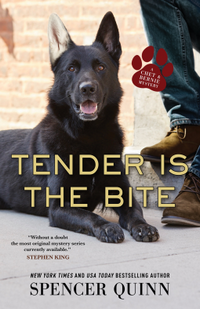


![]()



